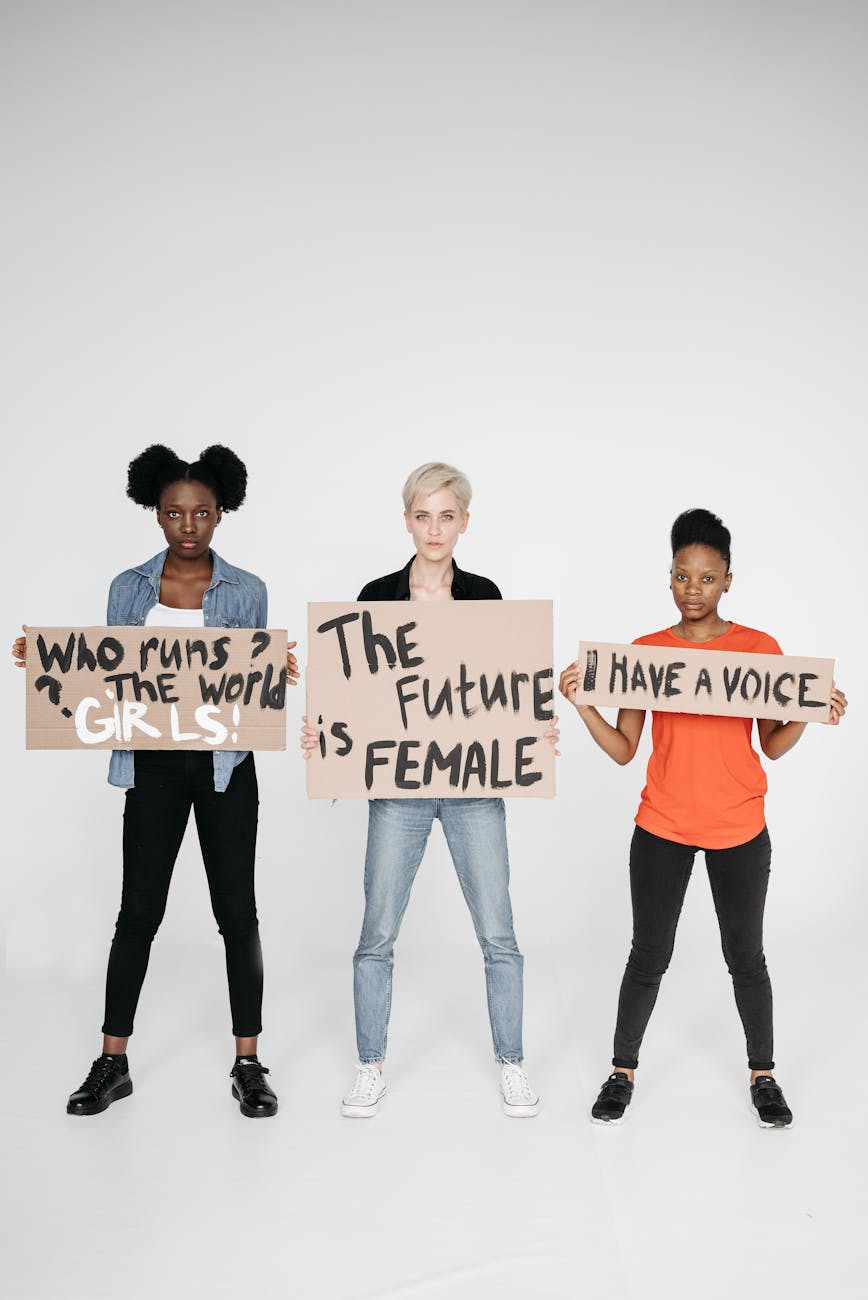@skynews Interest in a movement called ‘#4B’ surged #online immediately after news broke that #donaldtrump had won the #USelection. What is it and and why are #women in #America joining it? 🔽♀️ #US #Harris #womenempowerment ♬ original sound – Sky News
4B or “Four Nos” is a radical feminist[1] movement that originated in South Korea. The name refers to its defining four tenets which all start with the Korean-language term bi (Korean: 비; Hanja: 非), roughly meaning “no”.[2] Its proponents do not date men, get married, have sex with men, or have children with men.[3] The movement emerged during the mid-to-late 2010s[4][5] on Twitter[6] and on the website Womad.
The movement is considered to be fringe in South Korea, with estimated membership around 4,000 in 2019. In South Korea, a portion of its members, particularly those associated with the openly misandric[7] Womad, were described as transphobic and homophobic.[8]
Beliefs
The four core tenets to the 4B movement are:
- no sex with men (Korean: 비섹스; RR: bisekseu),
- no giving birth (비출산; bichulsan),
- no dating men (비연애; biyeonae), and
- no marriage with men (비혼; bihon).[4][9]
Bihon (marriage)
Since 2005, the feminist activist group UnniNetwork has promoted bihon as a political agenda to challenge the centrality of the heteronormative family model of marriage in Korea. They sought to replace mihon (‘not married’), with a more neutral term, bihon (‘single’).[10]
Bichulsan (childbirth)
South Korea has one of the lowest birth rates in the world.[11] With the fertility rate at just 0.72 (as of 2023) each South Korean woman on average will have fewer than one child in her lifetime.[12] This is significantly below the 2.1 threshold required to maintain a country’s population.[13] The country’s birth rate has been below replacement rate since 1983,[14] while the 4b movement originated in the 2010s, making it likely that the low birth rate is due to economic insecurity experienced by young adults, high child-rearing costs and property prices, and the country’s deeply ingrained patriarchal culture.[13][15][16]
Having the world’s lowest fertility rate, the South Korean government has adopted pro-natalist policies aimed at incentivizing an increase in childbirths, such as stipends for new parents, increased maternal and paternal leave, and child care subsidies.[17]
A 2022 survey of unmarried South Koreans aged 19 to 34 found that 79.8% of men and 69.7% of women expressed a desire to marry in the future. The survey also explored attitudes toward childbirth, including both married and unmarried young adults. Overall, 63.3% of respondents expressed a willingness to have children. However, there was a notable gender difference: 70.5% of men and 55.3% of women indicated a preference for having children.[18]
Biyeonae (no romance) and bisekseu (no sexual relationships)
Women of the 4B movement do not engage in romance and sexual relationships with men, because they see it as an extension of the patriarchal family structure. By embracing singlehood, they criticize the view of the pronatalist state that female reproductivity is a resource for the nation’s future.[19]
Notable proponents
Jung Se-young and Baeck Ha-na, two proponents, criticize marriage as reinforcing gender roles in South Korea.[9] The movement draws some amount of inspiration from the novel Kim Ji-young, Born 1982, as do South Korea’s MeToo and “Escape the Corset” movements.[5] The 4B movement claimed to have 4,000 members in 2019.[20]
History
The term 4B emerged from Korean feminist circles on Twitter around 2017 to 2018,[21] after a highly publicized 2016 murder of a woman by a man.[22] The murderer, who said he did it because women had ignored him, was not charged with a hate crime.[23] The 4B movement was also a reaction to social media content, including a misogynistic social media platform Ilbe Storehouse, which grew in prominence in 2014.[24]
The 4B movement gained broader recognition on Twitter in 2019 and through various feminist social media accounts. One notable feature of the 4B movement, as with other Korean digital feminist movements, is that members often identify themselves as “anonymous women,” as it is conventional not to disclose personal details online.[19]
Escape the Corset Movement
The “Escape the Corset” Movement that started in 2016 served as a source of inspiration for the 4B movement. The movement calls for women to liberate themselves from sexual, social, bodily, and from psychological oppression.[25] The word “corset” is used by Korean feminists as a metaphor for the societal mechanisms that bind and repress women, including toxic beauty standards. Notably, South Korea has the 10th largest beauty market globally and is the third-largest exporter of cosmetics.[26] In a society where beauty holds immense cultural and economic significance, members of the “Escape the Corset” Movement criticize and resist cosmetic procedures, demanding skincare or makeup rituals, and the adoption of trendy clothing, all seen as perpetuating consumerism and misogynistic social norms. In protest, they express their defiance by destroying makeup, forgoing cosmetic enhancements, shaving their heads, and rejecting fashionable attire. Escape the Corset’s analysis and approach to protest deeply influenced the 4B movement.[25]
South Korea’s #MeToo movement
Although the #MeToo movement originated in the United States in 2006 and gained popularity in 2017, many other countries, including South Korea, created #MeToo movements of their own. The #MeToo movement in South Korea, like those in other countries, encouraged women to express their experiences of sexual harassment to inspire social change. Shortly after its inception in late 2017, several hundred women stepped forward with claims of sexual harassment and violence.[27] This movement also encouraged previous comfort women of the Imperial Japanese Army during World War II and the Japanese occupation of Korea to speak more freely in large numbers about their sexual abuse.[27] The Korean #MeToo movement also focused on femicide, non-consensual pornography, and misogynistic practices in the workplace.
The #MeToo movement also inspired various online hashtag campaigns, most popularly the #WithYou[27] tag, to signal solidarity with survivors of sexual assault who had spoken up in the #MeToo movement. These various hashtags inspired the formation of women’s activist groups, such as Citizens Action to Support the #MeToo Movement, who campaigned to end gendered oppression and support victims of sexual abuse in South Korea.[28]
Continuation in South Korea
In South Korea, the movement has lost momentum since its early days.[29]
Although the exact membership remains uncertain, some unverified estimates suggest a range of 500 to 4,000 claimed participants.[30]
United States interest
After the 2024 United States presidential election in which Donald Trump won a second term, some American women expressed interest in the 4B movement as a form of protest against Trump’s election, his alleged sexual assaults, and for his role in the overturning of Roe v. Wade.[23] Shortly after the election was called, TikTok videos mentioning 4B were viewed hundreds of thousands of times, and Google searches about it spiked by 450%. American women have called the movement the “4 Nos” and “Lysistrata“.[21][31]
Purpose
The 4B movement is meant to serve as a direct opposition to what the movement views as South Korea’s patriarchal state and combat its pro-natalist policies, which view women’s bodies and reproductive abilities as tools for the state’s future. Feminists who engage in the 4B movement are known to actively resist the various ways in which gendered expectations are enforced in a conservative society, specifically relating to child-rearing, relationships, and employment.[32] This resistance involves not only withdrawing from dating but also rejecting prevalent gendered beauty standards and their associated consumerist practices in South Korea.[19] In a conservative and traditional society, alternative forms of protest in the 4B movement include defying rigid beauty norms and traditional gendered expectations by shaving heads and choosing not to wear bras.[24]
Reception
The 4B movement is considered to be fringe in South Korea, with Ju Hui Judy Han of UCLA arguing that “the vast majority of South Korean feminists do not abide by it”, and that “4B is not representative of Korean feminist politics”.[29]
Transphobia and homophobia in the South Korean movement
See also: Womad (website) and Gender-critical feminism § South Korea
Radical feminism as a whole in South Korea has had a notable transphobic and homophobic (against male homosexuals) presence, with internal dispute about the acceptability of such beliefs.[8][33][34][35] The 4B movement was significantly popular on (and widely publicly associated with) the South Korean website Womad, which is openly misandric, homophobic, and transphobic. The website was founded because Megalia had begun prohibiting homophobic and transphobic slurs.[19][36][35] Womad members reportedly advocated for revenge against men, advocated for disliked people to commit suicide, and some threatened violence and committed crimes against men. Any women who had children were criticized as enablers of patriarchy, with some being likened to slaves.[37] Some members of the 4B movement reportedly called for gender to be checked at public restrooms, and for protests to be segregated by gender.[29]
Some South Korean queer and trans feminists reportedly expressed concern that the 2024 international interest in the 4B movement could lead to an increase in anti-trans rhetoric and a resurgence of the 4B movement in South Korea.[29]
How Does The 4B Movement In America Benefit Men?
Simple really. The type of women we males used to unknowingly invite into our lives only to stab us in the back are totally exposing themselves. And they are getting a whole snowball of dumb broads to join. Gentlemen, this is the time to revel in love and joy! Let these women be bitter, be sluts, be stupid, and be alone.
Do not try to understand them at all, you will hurt your brain vessels. Don’t take it personal at all, they are confused children who crave validation and attention. This make-believe contest gives their otherwise mundane existences meaning. If we’re being honest here, most women are terribly boring, and selfish to boot. And it’s a big fight just to stick around long enough to screw them.
Don’t do it. There are much better women than these toxic All American little girls.
STAY TOXIC









Pingback: Since Kamala Proved Black Women Are Totally Unqualified To Run America, They Have Resorted To Screaming At Men Who Approach Them. – Love Faire